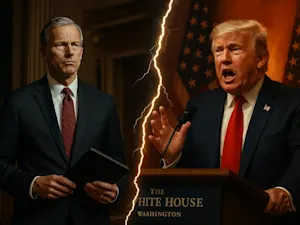
Tiangong Crisis: Chinese Capsule Hit by Orbital Debris
Chinese astronaut operating robotic arm, 2024. Photo courtesy of SciEngine under CC BY 4.0.
Three Chinese astronauts are stuck aboard the Tiangong space station after their return capsule was hit by space debris, forcing an emergency delay in their journey home. The Shenzhou-20 crew, who had been preparing to leave orbit, now face an indefinite wait as engineers scramble to assess the damage and plot a safe return from 250 miles above Earth.
Debris Strike Grounds Return Capsule
The incident unfolded just as the astronauts were gearing up for re-entry, with tiny fragments of orbital junk believed to have struck their return vehicle. China's human spaceflight agency, the China Manned Space Agency (CMSA), confirmed the impact but has not disclosed the extent of the damage or whether repairs are possible. The scheduled return, originally set for early November, has been postponed indefinitely while impact analysis and risk assessments continue.
The Independent reported CMSA stating, "The Shenzhou-20 crewed spacecraft is suspected to have been struck by a small piece of orbital debris, and assessment of the impact and associated risks is currently under way. To ensure the safety and health of the astronauts and the success of the mission, it has been decided that the Shenzhou-20 return mission, originally scheduled for 5 November, will be postponed."
Astronauts and Timeline of Mission
The crew aboard Shenzhou-20 includes mission commander Chen Dong, fighter pilot Chen Zhongrui, and engineer Wang Jie. They arrived at Tiangong in April for a six-month mission, conducting scientific experiments and maintenance tasks, including repairs to the station itself. Their replacements, the Shenzhou-21 team astronauts Zhang Hongzhang, Wu Fei, and Zhang Lu docked with the station in late October, and the two crews were in the middle of a handover when the debris strike occurred.
Crew Reassures While Ground Teams Analyze Risks
Despite the setback, the stranded astronauts have communicated calmly from orbit, reassuring ground control and the public they remain safe. CMSA emphasized that crew safety and mission success are priorities while the assessment continues. The return mission was postponed to ensure astronauts' health and safety during ongoing risk evaluation.
Orbital Debris: An Escalating Threat
The situation spotlights the mounting threat posed by space debris in Earth's increasingly crowded low Earth orbit. Experts estimate over 200,000 objects ranging between 1 and 10 centimeters, alongside tens of thousands of larger debris pieces, circle Earth. These include defunct satellites, exploded rocket parts, and fragments from past collisions, heightening collision risks for active spacecraft.
Tiangong: China's Solo Space Station
China's Tiangong station, fully operational since 2022, stands as the centerpiece of the nation's independent space program unlike the multinational International Space Station. The Shenzhou missions regularly rotate crews of three astronauts on six-month assignments, demonstrating China's expanding space capabilities.
First Return Mission Delayed by Space Junk
Observers note the irony that China's showcase mission for orbital control and precision is now felled by humanity's own space clutter. This debris strike marks the first time a Shenzhou return mission has been postponed due to orbital debris, underscoring the delicate challenges of operating in congested space lanes.
Plans If Shenzhou-20 Is Unrepairable
Existing protocols call for the stranded crew to return aboard Shenzhou-21 should the Shenzhou-20 capsule prove beyond repair. If both capsules are compromised, a backup spacecraft would launch from the Jiuquan Satellite Launch Centre in northwest China to ensure a safe retrieval.
Parallels With NASA's Extended Stays
This episode echoes challenges faced by NASA astronauts during extended stays aboard the International Space Station after technical issues with the Boeing Starliner capsule in 2024. Though the nature of the delays differs technical problems versus debris collision the predicament of being stranded in space highlights ongoing space travel risks.
Calls for International Cooperation on Space Junk
The growing menace of orbital debris has fueled demands for global cooperation on tracking and managing space junk. In recent forums, including last year's meeting, Chinese President Xi Jinping called for joint efforts between China and Arab nations to build a space debris observation center, reflecting the collective scope of the challenge.
Two Crews Co-Exist in Orbit as the Drama Unfolds
Currently, the Tiangong station hosts an unusual overlap of two crews, symbolizing China's resilience and adaptability in space exploration. Yet the delay serves as a sobering testament to how space is no longer a pristine frontier but a contested environment where survival requires precision, vigilance, and sometimes a bit of luck.
For now, Shenzhou-20's astronauts remain stranded, their homecoming on hold as ground teams work to open a safe path back. Their fate and the broader fight against orbital debris will unfold in the days ahead, marking the next chapter in humanity's ongoing quest beyond Earth.
References: Chinese astronauts stranded at Tiangong space station after debris strike | 3 Chinese astronauts stranded in space. Everything to know | Astronauts stranded in space after their return capsule is struck by mystery object in orbit
























